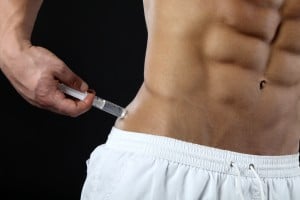 Testosterone Supplementation
Testosterone Supplementation
After reading part one and two you should have a fairly good understanding of the benefits of testosterone. Below is a quick review of the benefits of testosterone supplementation.
- Increased Libido
- Increased bone mineral density
- Increased muscle mass
- Decreased fat
- improved sleep
- Improved Memory
- Improved concentration
- Feeling of well-being
- Increased insulin sensitivity
- Improved cholesterol panel
- Increased coronary blood flow
- Reversal of arterial plaque
- Endothelial health
- Decrease the incidence of prostate cancer
- Increased energy
These benefits strongly support the use of testosterone supplementation in individuals who have sub-optimal levels, the next question is what is the best route. We will look at each option and you can read the pros and cons of each.
Natural Testosterone Boosters
You can see these advertised late night on TV and in the back of many magazines, they claim to be very effective and the natural safe way to raise your testosterone to optimal levels. The bottom line they don’t work, save your money. Fish oil has some slight effect by decreasing the production of sexual hormone binding globulin leaving more testosterone free and functional, but it is a very small amount.
Zinc has also been shown to block the aromatase step that converts testosterone to estrogen but again the overall effect is slight. Far and away the best supplement is DHEA which converts both to estrogen and testosterone but again the effect is minimal and will not increase levels to optimal. I can’t say this loud enough natural testosterone boosters are a waste of your money.
Patches and Creams
Patches and creams are another way testosterone supplementation can be achieved. These have definitely become more popular in the last 5-10 years prior to that they were mainly used by females. The creams need to be applied everyday and must be rubbed into a hairless area of skin thoroughly. The patches were used to decrease the effort associated to with application of a daily creme. These both have similar results and are usually met with less than desirable results.
The absorption of the testosterone transdermally is inconsistent and associated with a high conversion to dihydro-testosterone. It is this dihydro-testosterone that causes men’s hair to fall out and make their prostate big. While these are convenient, if you don’t mind rubbing a creme on every day or applying a patch, patient satisfaction long-term is low.
Oral Testosterone Supplementation
Used most commonly in women the results are poor and associated with liver damage. Testosterone is metabolized by the liver and is of little to no benefit when taken orally. There is a form, methyl-testosterone, which can be taken orally but it lasts for only a few hours and it would require the patient to take it every 4-6 hours. Compliance is very poor with any medication taken more than once or twice a day. We do not recommend oral testosterone supplementation due to its adverse liver effects.
Human Chorionic Gonadotropin
This is the one you have heard of associated with weight loss, eat 500 calories a day, inject HCG and you lose weight. I would suggest, as have others, eating 500 calories a day and you’ll lose weight by skipping the daily HCG injection. For testosterone production it is used slightly differently, injections are done twice weekly and have a direct effect on the Leydig cell in the testicles triggering testosterone production.
Limitations are most commonly associated with age. The older your Leydig cells the less able they are to produce testosterone no matter how much HCG is injected. In the 40-50 year old male these injections work quite well and have no suppression on spermatogenesis.
Testosterone Injections
This is the gold standard of testosterone replacement therapy. The most common form used is testosterone cypionate, which is testosterone in cottonseed oil. Injections are done on a weekly to twice weekly basis and done as an intramuscular injection. The cottonseed oil is used to create a depot effect that allows small amounts to be absorbed into the circulation, creating a more consistent testosterone level. The only drawback is sticking to yourself once or twice a week.
Conclusion
Testosterone supplementation can be very beneficial to the aging male ( and Female) when used under medical supervision and with close follow-up. I would recommend that anyone interested in this type of therapy find an individual who is well-trained in age management and discuss this with them. Men wishing to have children need to be very careful about using testosterone due to the possible suppression of spermatogenesis. These individuals would be better off using HCG.
See related articles.
“Testosterone Part II: Erectile Dysfunction”
“Testosterone Part 1: What’s Normal?”
“Cardiovascular Disease Linked to Treatments that Lower Testosterone”
